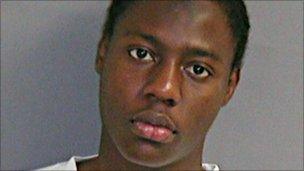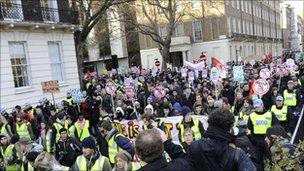Universities 'must be vigilant' on campus extremism
- Published

Former London student Umar Farouk Abdulmutallab is accused of attempting to blow up a plane flying to the United States
Universities must remain vigilant to campus extremism while protecting freedom of speech, a report from the sector has said.
Universities UK launched a review following an outcry after the arrest in 2009 of a former London student accused of trying to blow up a plane.
A survey, answered by 40 of their 133 members, found half had regular contact with counter-terrorism officers.
Nearly all had regular contact with the police.
As a result of the review, Universities UK has now released updated guidance , externalfor universities on how to promote free speech on campus "while protecting the welfare of staff, students and the wider community".
'Deradicalise universities'
Umar Farouk Abdulmutallab - the alleged "underwear bomber" - is accused of attempting to blow up a plane flying to the United States on Christmas Day in 2009.
He was a former student of University College London (UCL) and closely involved with its Islamic Society.
An inquiry by UCL found no evidence that the Nigerian had been radicalised while at university.
The British-based man Taimour Abdulwahab al-Abdaly, who blew himself up in Sweden last December, had been a student at university in Luton.

Protests are an important demonstration of free speech, universities say
Before Christmas, Prime Minister David Cameron told MPs Britain needed to do more to "de-radicalise our universities".
The updated guidance from Universities UK sets out the legal duties universities have to protect freedom of speech and also to promote equality and security.
Professor Malcolm Grant, chairman of the review panel, said: "The survey findings confirm how seriously universities take their responsibilities in relation to the safety and security of their staff and students, alongside their obligations to protect and promote free speech and academic freedom.
"Universities are open institutions where academic freedom and freedom of speech are fundamental to their functioning.
"Views expressed within universities, whether by staff, students or visitors, may sometimes appear to be extreme or even offensive. However, unless views can be expressed they cannot also be challenged.
"But all freedoms have limits imposed by law and these considerations are vital to ensure the safety and well being of students, staff and the wider community.
"Universities must continue to ensure that potentially aberrant behaviour is challenged and communicated to the police where appropriate."
But he added that it was not the job of universities to impede the freedom of speech "through additional censorship, surveillance or invasion of privacy".
Gay rights
The report looks at the issue of controversial guest speakers - often a trigger for protests or demands for meetings to be banned - and sets out good practice.
Protests, student societies, displays of notices, distribution of literature and the impact of electronic communications were cited as "challenges" to universities in their balancing of free speech against other rights and responsibilities.
Most often, these were those connected to animal rights, politics and religious extremism, the report said, while gay rights, ethical campaigns and language rights also proved controversial.
Universities UK says its survey shows that media accusations that universities were complacent about security were unjustified.
It says its survey suggests two-thirds of universities have been involved with a government strategy called Prevent , externalwhich aims to stop people becoming terrorists or supporting terrorism both in the UK and overseas.
The coalition is reviewing the strategy - but says it will continue to tackle international terrorism and do "targeted local work to support people who are most vulnerable to radicalisation and to disrupt propagandists for terrorism".
Last year Labour's higher education minister David Lammy confirmed to the BBC that Special Branch officers were working closely with a number of universities.
- Published16 December 2010